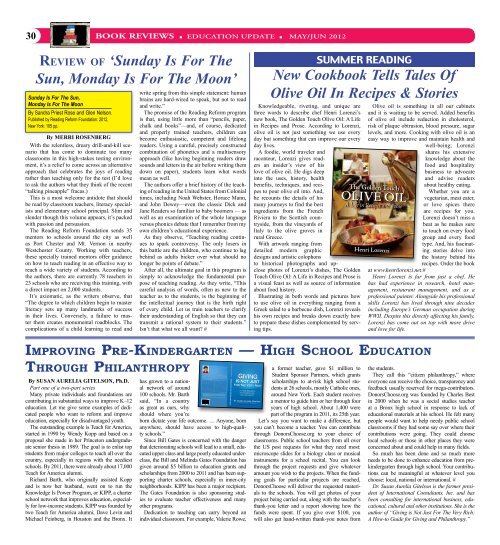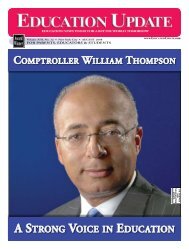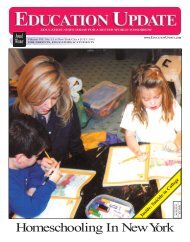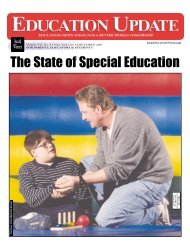Create successful ePaper yourself
Turn your PDF publications into a flip-book with our unique Google optimized e-Paper software.
Dr. Susan Aurelia Gitelson covers the reasons to give,considers values and concerns, and o fers advice on howto give wisely. She talks abou the wealthiest donors, innovativegivers, social entrepreneurs, celebrities, governmento ficials, nonprofit professionals, volunteers, and socialmedia networkers. Analyzing the major areas for giving,she reviews religious philanthropy, education K-12, highereducation, science, health, arts, culture, humanities, sports,multipurpose umbre la organizations, awards, and internationalaid. Finally, readers are shown how to evaluate charities, make choices,and realize their commitments. A valuable resource, Giving Is Not Just For TheVery Rich is an inspiring, easy-to-use guide which presents numerous creativeideas on how to reap the many benefits of giving. It’s a l about feeling connectedto worthwhile programs, achieving a sense of purpose, and deriving immeasurablepleasure from helping others.needed great work ahead.”ISBN 978-14681110409 781468 11104030 BOOK REVIEWS ■ EDUCATION UPDATE ■ may/jun 2012Review of ‘Sunday Is For TheSun, Monday Is For The Moon’Sunday Is For The Sun,Monday Is For The MoonBy Sandra Priest Rose and Glen Nelson.Published by Reading Reform Foundation: 2012,New York: 105 pp.By Merri RosenbergWith the relentless, dreary drill-and-kill scenariothat has come to dominate too manyclassrooms in this high-stakes testing environment,it’s a relief to come across an alternativeapproach that celebrates the joys of readingrather than teaching only for the test (I’d loveto ask the authors what they think of the recent“talking pineapple” fracas.)This is a most welcome antidote that shouldbe read by classroom teachers, literacy specialistsand elementary school principal. Slim andslender though this volume appears, it’s packedwith passion and persuasion.The Reading Reform Foundation sends 35mentors to schools around the city as wellas Port Chester and Mt. Vernon in nearbyWestchester County. Working with teachers,these specially trained mentors offer guidanceon how to teach reading in an effective way toreach a wide variety of students. According tothe authors, there are currently 78 teachers in23 schools who are receiving this training, witha direct impact on 2,000 students.It’s axiomatic, as the writers observe, that“The degree to which children begin to masterliteracy sets up many landmarks of successin their lives. Conversely, a failure to masterthem creates monumental roadblocks. Thecomplications of a child learning to read andwrite spring from this simple statement: humanbrains are hard-wired to speak, but not to readand write.”The promise of the Reading Reform programis that, using little more than “pencils, paper,chalk and books”—and, of course, dedicatedand properly trained teachers, children canbecome enthusiastic, competent and lifelongreaders. Using a careful, precisely constructedcombination of phonetics and a multisensoryapproach (like having beginning readers drawsounds and letters in the air before writing themdown on paper), students learn what wordsmean as well.The authors offer a brief history of the teachingof reading in the United States from Colonialtimes, including Noah Webster, Horace Mann,and John Dewey—even the classic Dick andJane Readers so familiar to baby boomers — aswell as an examination of the whole languageversus phonics debate that I remember from myown children’s educational experience.As they observe, “Teaching reading continuesto spark controversy. The only losers inthis battle are the children, who continue to lagbehind as adults bicker over what should nolonger be points of debate.”After all, the ultimate goal in this program issimply to acknowledge the fundamental purposeof teaching reading. As they write, “Thiscareful analysis of words, often as new to theteacher as to the students, is the beginning ofthe intellectual journey that is the birth rightof every child. Let us train teachers to clarifytheir understanding of English so that they cantransmit a rational system to their students.”Isn’t that what we all want? #New Cookbook Tells Tales OfOlive Oil In Recipes & StoriesKnowledgeable, riveting, and unique arethree words to describe chef Henri Lorenzi’snew book, The Golden Touch Olive Oil: A Lifein Recipes and Prose. According to Lorenzi,olive oil is not just something we use everyday but something that can improve our everyday lives.A foodie, world traveler andraconteur, Lorenzi gives readersan insider’s view of hislove of olive oil. He digs deepinto the uses, history, healthbenefits, techniques, and recipesto pour olive oil into. And,he recounts the details of hismany journeys to find the bestingredients from the FrenchRiviera to the Scottish countryside,from the vineyards ofItaly to the olive groves inrural Greece.With artwork ranging fromdetailed modern graphicdesigns and artistic colophonsto historical photographs and upclosephotos of Lorenzi’s dishes, The GoldenTouch Olive Oil: A Life in Recipes and Prose isa visual feast as well as source of informationabout food history.Illustrating in both words and pictures howto use olive oil in everything ranging from aGreek salad to a barbecue dish, Lorenzi revealshis own recipes and breaks down exactly howto prepare these dishes complemented by servingtips.SUMMER READINGOlive oil is something in all our cabinetsand it is waiting to be served. Added benefitsof olive oil include reduction in cholesterol,risk of plaque obtrusion, blood pressure, sugarlevels, and more. Cooking with olive oil is aneasy way to improve and maintain health andwell-being; Lorenzishares his extensiveknowledge about thefood and hospitalitybusiness to advocateand advise readersabout healthy eating.Whether you are avegetarian, meat eater,or love spices thereare recipes for you.Lorenzi doesn’t miss abeat as he makes sureto touch on every foodgroup and every foodtype. And, his fascinatingstories delve intothe history behind hisrecipes. Order the bookat www.henrilorenzi.net.#Henri Lorenzi is far from just a chef. Hehas had experience in research, hotel management,restaurant management, and as aprofessional painter. Alongside his professionalskills Lorenzi has lived through nine decadesincluding Europe’s German occupation duringWWII. Despite this directly affecting his family,Lorenzi has come out on top with more driveand love for life.The Golden TouchOlive OilA Life in Recipes and ProseHenri lorenziImproving Pre-Kindergarten — High School <strong>Education</strong>Through PhilanthropyBy Susan Aurelia Gitelson, Ph.D.Part one of a two-part seriesMany private individuals and foundations arecontributing in substantial ways to improve K–12education. Let me give some examples of dedicatedpeople who want to reform and improveeducation, especially for disadvantaged youth.The outstanding example is Teach for America,started in 1990 by Wendy Kopp and based on aproposal she made in her Princeton undergraduatesenior thesis in 1989. The goal is to enlist topstudents from major colleges to teach all over thecountry, especially in regions with the neediestschools. By 2011, there were already about 17,000Teach for America alumni.Richard Barth, who originally assisted Koppand is now her husband, went on to run theKnowledge Is Power Program, or KIPP, a charterschool network that improves education, especiallyfor low-income students. KIPP was founded bytwo Teach for America alumni, Dave Levin andMichael Feinberg, in Houston and the Bronx. Ithas grown to a nationalnetwork of around100 schools. Mr. Barthsaid, “In a countryas great as ours, whyshould where you’reDr. Susan Aurelia Gitelson received Council of the Columbia School ofher B.A. from Barnard Co lege and her International and Public A fairs (SIPA)M.I.A. and Ph.D. from Columbia University.She was a trainee a the Rockefeller Gitelson Policy Forum and the Gitelsonand supported the Columbia SIPAFoundation and later was an assistant Peace Publications of the Truman Instituteof the Hebrew University. She hasprofessor of international relations atthe Hebrew University of Jerusalem. For been president of International Consultants,Inc. Dr. Gitelson has publishedmany years, she headed several sma linternational business firms, using her books and articles on four continents,income to sponsor cultural and educationalprograms. Awarded the presti-Advisers of the National Commi tee onand is a member of the Board ofgious Alumni Medal for Distinguished American Foreign Policy. She is listedService by Columbia University, she in Who’s Who in America and Who’sserved as co-chair of the Dean’s Who in the World.“Dr. Susan Gitelson reminds us of how much good philanthropy hasdone and how much remains to be done. The book will inspire theDr. Anthony W. Marx, President and CEO, The New York Public Libraryborn dictate your life outcome. … Anyone, bornanywhere, should have access to high-qualityschools.”Since Bill Gates is concerned with the dangerthat deteriorating schools will lead to a small, educatedupper class and large poorly educated underclass,the Bill and Melinda Gates Foundation hasgiven around $5 billion to education grants andscholarships from 2000 to 2011 and has been supportingcharter schools, especially in inner-cityneighborhoods. KIPP has been a major recipient.The Gates Foundation is also sponsoring studiesto evaluate teacher effectiveness and manyother programs.Dedication to teaching can carry beyond anindividual classroom. For example, Valerie Rowe,GivinG is not Just For the very richDr. Susan Aurelia GitelsonGivinGis not JustFor the very richA How-To GuiDefor GivinG AnDPHilAnTHroPyDr. susan Aurelia GitelsonForeword by Robert M. Morgenthaua former teacher, gave $1 million toStudent Sponsor Partners, which grantsscholarships to at-risk high school studentsat 26 schools, mostly Catholic ones,around New York. Each student receivesa mentor to guide him or her through fouryears of high school. About 1,400 werepart of the program in 2011, its 25th year.Let’s say you want to make a difference, butyou can’t become a teacher. You can contributethrough DonorsChoose.org to your choice ofclassrooms. Public school teachers from all overthe US post requests for what they need most:microscope slides for a biology class or musicalinstruments for a school recital. You can lookthrough the project requests and give whateveramount you wish to the projects. When the fundinggoals for particular projects are reached,DonorsChoose will deliver the requested materialsto the schools. You will get photos of yourproject being carried out, along with the teacher’sthank-you letter and a report showing how thefunds were spent. If you give over $100, youwill also get hand-written thank-you notes fromthe students.They call this “citizen philanthropy,” whereeveryone can receive the choice, transparency andfeedback usually reserved for mega-contributors.DonorsChoose.org was founded by Charles Bestin 2000 when he was a social studies teacherat a Bronx high school in response to lack ofeducational materials at his school. He felt manypeople would want to help needy public schoolclassrooms if they had some say over where theircontributions were going. They could chooselocal schools or those in other places they wereconcerned about and could help in many fields.So much has been done and so much moreneeds to be done to enhance education from prekindergartenthrough high school. Your contributionscan be meaningful at whatever level youchoose: local, national or international. #Dr. Susan Aurelia Gitelson is the former presidentof International Consultants, Inc. and hasbeen consulting for international business, educational,cultural and other institutions. She is theauthor of “Giving is Not Just For The Very Rich:A How-to Guide for Giving and Philanthropy.”

















